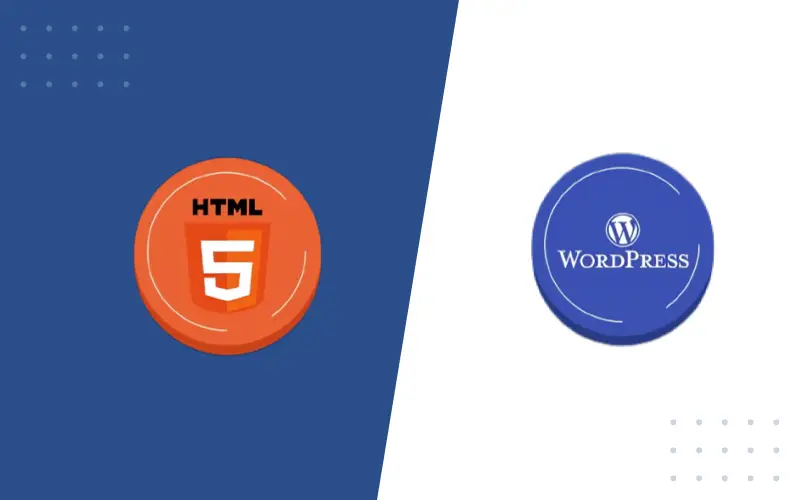When building a website, the choice between using HTML and WordPress is crucial. Both approaches have distinct advantages and disadvantages, making them suitable for different needs and preferences. Here, we provide a comparative analysis of HTML and WordPress to help you make an informed decision.
What Is the Difference Between WordPress and HTML?
1. HTML Website Development
Advantages of HTML
- Simplicity and Control: HTML websites are straightforward, especially for smaller sites with fewer pages. Developers have direct control over every aspect of the site’s structure and content, enabling precise customization.
- Performance and Speed: HTML websites typically load faster since they don’t rely on server-side processing. The data is cached at the client’s end, reducing server load and compilation time.
- Cost-Effectiveness: For smaller sites, HTML can be more cost-effective due to the lack of need for expensive hosting solutions. Maintenance costs are also lower as there are fewer updates and dependencies.
- Security: HTML sites are less vulnerable to hacking as they don’t rely on databases or third-party plugins, making them a secure choice for businesses concerned about online threats.
Disadvantages of HTML
- Scalability Issues: As the website grows, adding new pages and managing content becomes cumbersome. HTML does not provide a simple way to scale up content management, which can hinder expanding businesses.
- Technical Expertise Required: Managing an HTML website requires a good understanding of HTML, CSS, and JavaScript. This can be a barrier for non-technical users who wish to manage their websites independently.
2. WordPress Website Development
Advantages of WordPress
- Ease of Use: WordPress is known for its user-friendly CMS, allowing individuals without technical expertise to create, manage, and update their websites easily.
- Extensibility: With numerous plugins and themes, WordPress offers unmatched flexibility. Users can add new features, functionalities, and design elements without needing to code.
- Community Support: As an open-source platform, WordPress has a large community of developers and users who continuously contribute to its improvement and offer support.
Disadvantages of WordPress
- Performance Overhead: WordPress sites can be slower due to the heavy CMS structure. They require regular optimization, updates, and maintenance to stay secure and functional.
- Hosting and Maintenance Costs: WordPress sites often need more robust hosting solutions, increasing costs. Additionally, extra security measures and ongoing maintenance can add to the expense.
- Security Concerns: The open-source nature of WordPress makes it more susceptible to potential security vulnerabilities. Regular updates and security measures are essential to protect against threats.
Conclusion
Choosing between WordPress and HTML depends largely on the specific needs and goals of your website:
- HTML is ideal for small, static websites where performance and security are primary concerns, and where frequent updates or content changes are not necessary.
- WordPress is better suited for dynamic, content-rich websites that require regular updates, extensive customization, and easy management without deep technical knowledge.
If you want a simple, fast, and secure website and have the technical skills (or resources) to manage it, HTML is a good choice. However, if you need a flexible, scalable, and user-friendly platform that allows for easy content management and customization, WordPress is the way to go.
Need help deciding or building your website? Contact SYSMIC, expert Web Developers in Navi Mumbai! We specialize in creating both HTML and WordPress websites tailored to your specific needs. Contact us today to start your web development journey and make your online presence stand out.





Leave a Reply